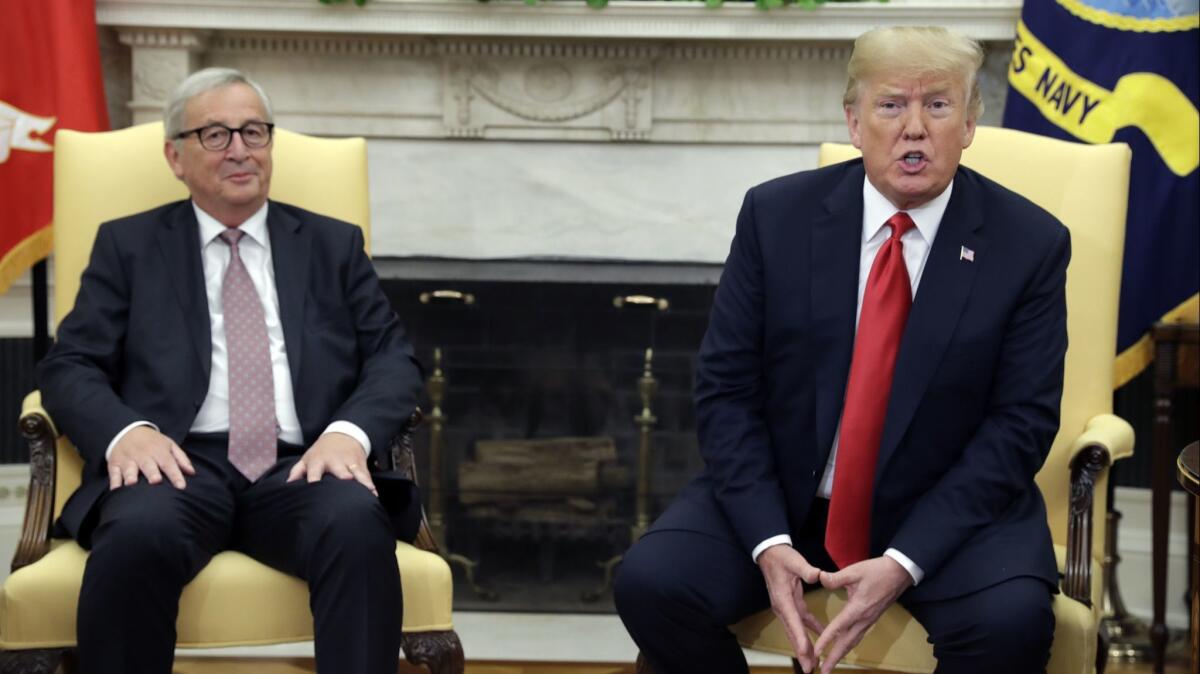Op-Ed: Europeans are free traders now? That’s rich

- Share via
After President Trump met with European Commission President Jean-Claude Juncker on Wednesday, tensions between the two economic powerhouses abated, as the United States and the European Union announced an agreement to move forward on trade negotiations.
But all is not as it seems. The “deal,” such as it is, is vintage EU: the agricultural sector is excluded, except for soybeans. This won’t be good news for American farmers, who struggle to gain a foothold in a highly protected European market. The Obama administration refused to accept an agriculture carve-out when negotiating a trade agreement with the Europeans.
Our friends across the pond have deftly taken advantage of President Trump’s rejection of the global status quo to cast themselves as defenders of free trade. But actions speak louder than words. As recently as the G-7 summit in June, the United States floated the idea that the members of the G-7 simply eliminate all their tariffs. The self-proclaimed free trader nations, including those from the EU, were caught with their tail between their legs.
We need real reform at the WTO, not surgical agreements here and there.
German Chancellor Angela Merkel, for example, faltered, saying that eliminating tariffs would require intense negotiations and “take a long time.” In truth, every WTO member could simply take its tariff commitments and change all the positive numbers to zero.
That certainly puts Wednesday’s announcement in context.
As current and former U.S. trade negotiators, including me, know all too well, the EU and others are no more free traders than is Trump. The Europeans like to protect their markets — like agriculture — they just don’t like it when U.S. leaders protect ours. To be clear, in the aftermath of World War II, the United States created this asymmetrical system: We slashed our tariffs more than our trading partners did. The Europeans could charge up to 6% on primary aluminum imports, whereas the United States, for the most part, capped itself at zero.
In that regard, Europe’s outrage at the president’s imposition of a 10% tariff on aluminum is a bit rich. The WTO expressly authorizes members to protect their essential security interests. Steel and aluminum fall in that realm; it was an open secret on Capitol Hill that the Obama administration shared that view and considered invoking the same provision.
In response to Trump’s action, the EU manipulated the rules to reject the U.S. national security claim and imposed counter-tariffs, bypassing WTO dispute settlement.
How is dodging the very rules of a structured system a defense of that system? It is not.
Amidst all this cynicism, all is not lost. A true champion of the system may finally have emerged: Norway. The Norwegians have chosen to do what champions of the system are supposed to do — forgo the instant gratification of retaliation and instead work through the dispute settlement system, however plodding it may be.
Some Europeans recognize the systemic imbalance. The political editor of the German newspaper Die Zeit acknowledged in a recent New York Times op-ed that “[the] Europeans have basically been free riders … spending almost nothing on defense, and instead building vast social welfare systems at home and robust, well-protected export industries abroad. Rather than lash back at Mr. Trump, they would do better to ask how we got to this place, and how to get out.”
The point about vast social welfare systems is one that Democrats must bear in mind. It is Democrats, not Republicans, who have a proud tradition of fighting for a social safety net for dispossessed workers so that job losses, due to trade or otherwise, don’t have to destroy lives.
Enter the Fray: First takes on the news of the minute from L.A. Times Opinion »
Democrats will not reclaim the Midwest, which decided the 2016 election by less than 100,000 votes, by rejecting Trump’s willingness to disturb the global trading system, by welcoming half-measures such as the one the Europeans pitched Wednesday, or by buying into the notion that the Trans-Pacific Partnership is a magic bullet. Remember that Trump borrowed critiques of TPP from Midwest Democrats, such as Sherrod Brown and Sandy Levin, not Republicans such as Mike Pence and Paul Ryan, who embraced the deal.
Democrats have long known that trade theory and trade reality are two different things, and that our trading system needs reform. Even the WTO director-general commented that the systemic “shake-up” is positive in many ways and encouraged member nations to use this as an opportunity to improve the multilateral trading system.
But we can’t be fooled by the kinds of deals we saw Wednesday. We need real reform at the WTO, not surgical agreements here and there. Trump’s presidency is at least in part the product of exasperated workers who’ve been left behind by globalization. If that fundamental unfairness isn’t addressed, he won’t be the last president elected on a platform of blowing up the system.
Beth Baltzan is a recent U.S. WTO litigator in the Executive Office of the President of the United States. From 2012 to 2016, she served as Democratic House Ways and Means trade counsel.
Follow the Opinion section on Twitter @latimesopinion or Facebook.
More to Read
A cure for the common opinion
Get thought-provoking perspectives with our weekly newsletter.
You may occasionally receive promotional content from the Los Angeles Times.










